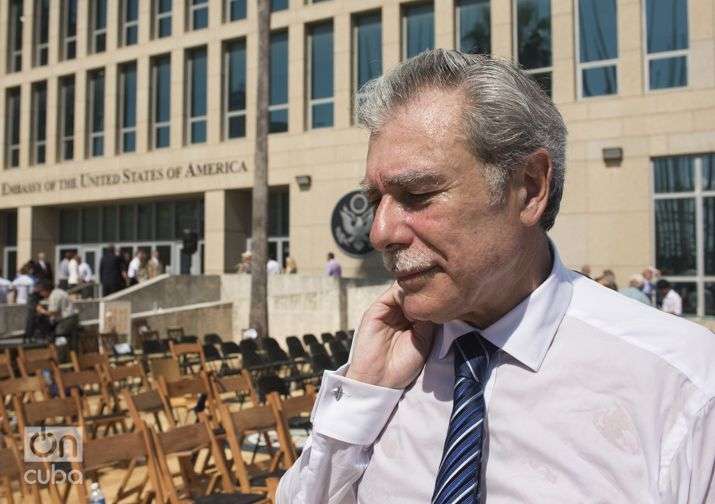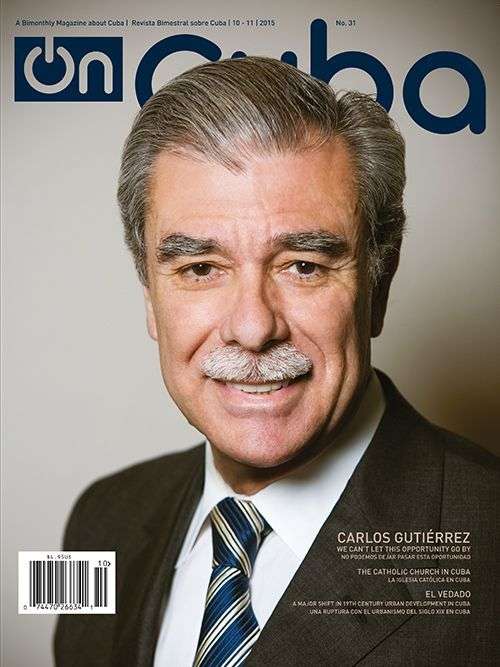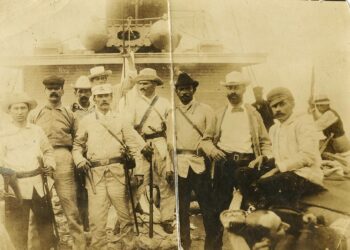Carlos Gutierrez is a Cuban-American business leader who was the CEO of Kellogg and Secretary of Commerce during the Bush administration. He used to be a Republican and held a hard-line stance toward Cuba. But when Obama opened the door to relations with Cuba, he did a 180 and helped push for engagement with the island.
Belly of the Beast journalist Liz Oliva Fernández interviewed Gutierrez during her visit to Washington, D.C. Gutierez spoke about his personal journey, Cuban-American politicians and the Biden-Harris policy toward Cuba.
Liz Oliva Fernández: Carlos Gutierrez was the CEO of Kellogg’s, and later Commerce Secretary under George W. Bush. He supported U.S. sanctions and regime change in Cuba.
Carlos Gutierrez: The administration of President Bush is committed to accompanying Cubans through a transition to political and economic freedom.
L.O.F: But Gutierrez had a change of heart after Obama announced the new opening with Cuba.
C.G: I’ve been a Republican all my life until now. I’m an independent. And that happened when Trump became president. I grew up in a household which was very conservative. My father was very against the revolution and I inherited talking points from my father. But I’ve had an obsession with Cuba. I have read everything: pro, con, you name it.
So when President Obama decided to normalize that’s when I said: I’m getting involved. This is my opportunity to make a shift. I lost 95% of my friends in Miami, but I would do it again.
L.O.F: Why did you lose your friends?
C.G: Because I decided to go to Cuba, speak out against the embargo, speak in favor of what was happening in Cuba, speak in favor of normalization.
I am so glad I did. I would do it again. I became the chairman of the U.S. Cuba Business Council at the Chamber of Commerce. I think I went down fifteen times and I loved every single time.
L.O.F: I just wanted to know about how you got involved in politics.
C.G: I met President Bush in 1998 so I was never involved. I was somewhere in the world working for Kelloggs. Finally, I saw him in 2004 I think it was, and he offered me a job. I got involved almost by accident.
L.O.F: Was the United States doing business with Cuba at that time?
C.G: No, no, no.
It was some food products, some medicines. But the embargo was very tight, very strong. It was a hardline administration. And I have to admit, I used hardline rhetoric.
L.O.F: When did you shift?
C.G: I had been shifting for years. So when Obama announced normalization, that was it. I wrote an op-ed in the New York Times. I was able to announce: I have changed. I was always thinking about Cuba. So when the moment came, it was easy.
It was easy to say: I’ve been thinking about it, I’ve thought about it, I don’t need to think about it anymore. I want to get involved. So I went down the first time when Kerry opened the embassy. I’m very glad that they accepted me in because I was Republican, a hardliner. I didn’t know if I was going to feel anger or sad. I felt joy.
Everyone was going to Cuba: hotels, manufacturing, tractor manufacturing. Everyone wanted to be in Cuba. People were buying and selling homes. The restaurants, the paladares. I remember there were some stores for pets, barber shops. I’m glad that it’s continued.

L.O.F: Yeah, but now it’s pretty tough for private businesses to do business. They can’t access the raw materials they need. They can’t expand their businesses because they have a lack of capital. And they can’t even apply to funds here in the United States and internationally because they are Cuban.
C.G: They can’t fly here anymore to get raw materials.
L.O.F: They can’t get a U. S. visa for business anymore. Before they had a five-year visa and now that’s gone. So can you explain how we went from the Obama era until now?
C.G: Obama was very criticized by Republicans in general, but in Miami, they hated him. The talking point is: You see, it didn’t work. That’s not true. I was there.
It was a tremendous success, not just business, but people making friends and people saying, hey, Cubans aren’t too bad. And Cubans, hey, Americans are pretty nice people. Relationships, cultural groups, people working in health laboratories, just normalizing the relationship. That couldn’t be stopped. They criticized it. And they criticized it. You should have seen what they said about me. But I would do it again.
L.O.F: I don’t know. What did they say about you?
C.G: They said I was a traitor. And you know Cubans. They could say a lot of things. Yeah, I know, about my family. But Trump came in and Trump wanted to win the state of Florida.
L.O.F: But he is a businessman like you. He’s a Republican like you used to be.
C.G: But he became a politician. And in order to win, he needed Florida.
L.O.F: Can you explain how U.S. sanctions toward Cuba hurt U.S. business enterprises that want to do business there?
C.G: There are agricultural businesses who would love to do business in Cuba. Food, medicine, any kind of business, anything that can help the economy and that there’s demand for. Cuba is one of the most beautiful places in the world. The tourism could be just unbelievable. And they took out cruise ships. It was extreme.
L.O.F: But United States citizens can’t travel freely to Cuba.
C.G: And they took out cruise ships. It was extreme. It was sad not just for people here. It was sad for Cubans, people in Cuba. That’s what I worry about.
L.O.F: What’s happening now with the Biden administration?
C.G: Nothing. We think that the U. S. sometimes is Miami. No, there are people all over this country who want to see better relations with Cuba.
Florida used to be what they call a swing state. It could go blue or red. Florida’s red. Democrats have lost Florida.
L.O.F: So why not do it now if they’re not getting Florida anyway?
C.G: That’s true. It would help him in other areas. The Chamber of Commerce, big business. They want to lift the embargo.
L.O.F: And they don’t have any power on Capitol Hill? Cuba’s different. Why is it so different? I want to understand that.
C.G: The embargo, Helms-Burton, is a law, so if you want to change it, you have to get the votes in Congress. And that’s never been done. The members of Congress who are in favor of the hardline, in favor of the embargo say: I will vote in favor of whatever you want, but just leave Cuba alone. I’ll vote for your bill if you do a vote for mine. There’s never been an embargo of years anywhere. Cuba has been unique.
L.O.F: How did these Cuban Americans become so powerful in Congress?
C.G: Today, Cubans run Miami. They have a lot of money and they’re engaged. The average American: Yeah, let’s open up Cuba. But they don’t wake up every morning and say: What are we going to do today? It’s intensity.
L.O.F: Where did this intensity, this strong feeling about Cuba come from? Because Marco Rubio wasn’t born in Cuba. Bob Menendez wasn’t born in Cuba either.
C.G: It’s a bit of an inherited point of view. I’ve been going to China for years.
When Deng Xiaoping announced that China was going to open up the first people to go back to invest were the Chinese who had left. Why? Because China is their country. Because that’s where their ancestors are from. That’s where they were born. There’s a link that is bigger than politics. That’s not the nature of Cubans.
I sometimes wonder: What do they think is going to happen? Is the policy to see blood on the streets? Or is there a feeling that we’re going to go back to our house [in Cuba] and we’re just going to live the way we did. That’s science fiction. I think at this point it’s just revenge. It’s, “we’re going to get back.” People have to understand, accept reality as it is. Cuba’s not going to go back.
L.O.F: Do you think that the new generations think different?
C.G: Some do. We’ve always felt that the new generations will be the ones who will want to take the embargo away. New generations do go to Cuba more. Many of them have told me: I had to wait for my grandfather to die. So I do think that there are more young Cuban Americans who are in favor of normalization with Cuba, but not as many as needed.
L.O.F: During the Obama era, there were a lot of U. S. entrepreneurs, private businesses, going there, doing business. Why are they not doing any lobbying right now?
C.G: There was lobbying. A lot of it was the Chamber of Commerce. But they were very careful. So I would call a bank and I’d say: Why don’t you do business in Cuba? They would say: We would love to be able to but we can’t because we don’t want to be criticized. We have business in Florida.
In many cases, people were in favor, but they didn’t want to be exposed. But that just shows the grip that the hard-line has over the politics. We need to expand the number of people who support, besides people who support today. We need new people.
L.O.F: How do we do that?
C.G: One thing that helped was all the people who went down for the first time. They realized this embargo is crazy. It is crazy and it’s hurting the Cuban people. So what bothers me is when somebody says: “We have the embargo because we want to help the Cuban people”. Go down to Havana, stand in line with them, and tell them you’re helping them.
L.O.F: When Trump arrived to the White House, the people at the Chamber of Commerce didn’t do anything to stop that policy?
C.G: The Chamber of Commerce tried. But you know what happened? As soon as things change, and there’s a new policy, if you want to be in with the administration, a lot of people went underground.
A lot of people who were very involved in Cuba all of a sudden disappeared because it was politically risky. What Obama did is he gave people cover. And that gave people courage. As soon as it went back, then people said, I’m just not going to risk it. There’s some who still will come to meetings, but we used to call meetings with business people and get 40 CEOs. Today, it’s very hard to get two or three.
L.O.F: It’s shocking to me because I suppose that these people have a business mentality so they want to do business.
C.G: It was disappointing because the White House wouldn’t listen. In the Congress, nobody wanted to take on the White House with an issue that perhaps wasn’t their number one issue.
L.O.F: Biden said that the best ambassadors to define Cuba policy were Cuban Americans. Who are the Cuban Americans that the Biden administration has been listening to so far?
C.G: Too many people who are in favor of lifting the embargo still go to Cuba to criticize, to point things out. And you can’t have it both ways. If you want to lift the embargo so that the government falls, it’s not going to work because the government knows that the reason you’re doing it is so that the government falls.
It has to be done for the right reasons. And the right reasons are: Let’s help the Cuban people, let’s help the Cuban economy. And with time, if people want them to change politically, that’s their decision. And maybe with time they will.
L.O.F: Did you have the opportunity to speak with someone in the Biden administration?
C.G: I’ve spoken with people around him. He wouldn’t take the risk. That’s the way he is. He’s a cautious politician.
L.O.F: Yeah, we don’t need that in Cuba. We need the opposite. When the Obama administration opened the relationship with Cuba, a lot of businesses in the U.S. were earning money. Who is earning money now?
C.G: I think some European firms are making money. Italians, Chinese, Koreans, who are selling trucks and selling buses and tractors. But American businesses didn’t have the time.
L.O.F: Are people getting money off the embargo?
C.G: That’s a very good question. I think there are people who make a living from the embargo. So the embargo is their cause and their cause gives them something to do, a job. So, yeah, there are organizations who live because of the embargo. Politicians gain power or influence by supporting the embargo.
L.O.F: When Biden said that he can’t do anything because he’s reviewing the policy toward Cuba, is that true? Is there something he can really do now?
C.G: By now he has had enough time. It’s classic. You create a commission, have a study group, and then they come back in nine months and it has to be reviewed. It’s a way of buying time. But by now, he could do things. The president has the power and the authority to do it through regulation.
Biden needs to say: “I am going to pick up where Obama left off. ”
________________________________________
*This interview is from April 2023. Due to its interest, OnCuba News reproduces it with the express authorization of Belly of the Beast.










